Key takeaways:
- Understanding crypto privacy laws is essential for safeguarding personal data and enhancing financial freedom while navigating a complex legal landscape.
- Key regulations like GDPR, BSA, and FATF significantly impact how cryptocurrencies are managed, requiring compliance that can challenge user anonymity.
- Best practices for ensuring compliance include regular data audits, obtaining user consent, and educating employees, all of which foster trust and mitigate risks.

Introduction to Crypto Privacy Laws
Diving into the world of crypto privacy laws can feel like wandering through a labyrinth. I remember the first time I tried to make sense of the regulations surrounding cryptocurrencies; the complexities were overwhelming. How do these laws really protect users, and what do they mean for my financial freedom?
Privacy in the crypto space is not just a technical consideration; it’s deeply intertwined with personal values. I once found myself debating with friends whether retaining our anonymity online is a fundamental right or a privilege tied to compliance. It’s a thought-provoking question: when we embrace cryptocurrencies for their decentralized nature, are we inadvertently sacrificing our privacy?
As I’ve navigated this evolving landscape, I’ve realized that staying informed about privacy laws is crucial. It’s not just about understanding the legalities; it’s about safeguarding our identity and assets. The journey has shown me that knowledge truly empowers users in a space that is both exciting and uncertain.
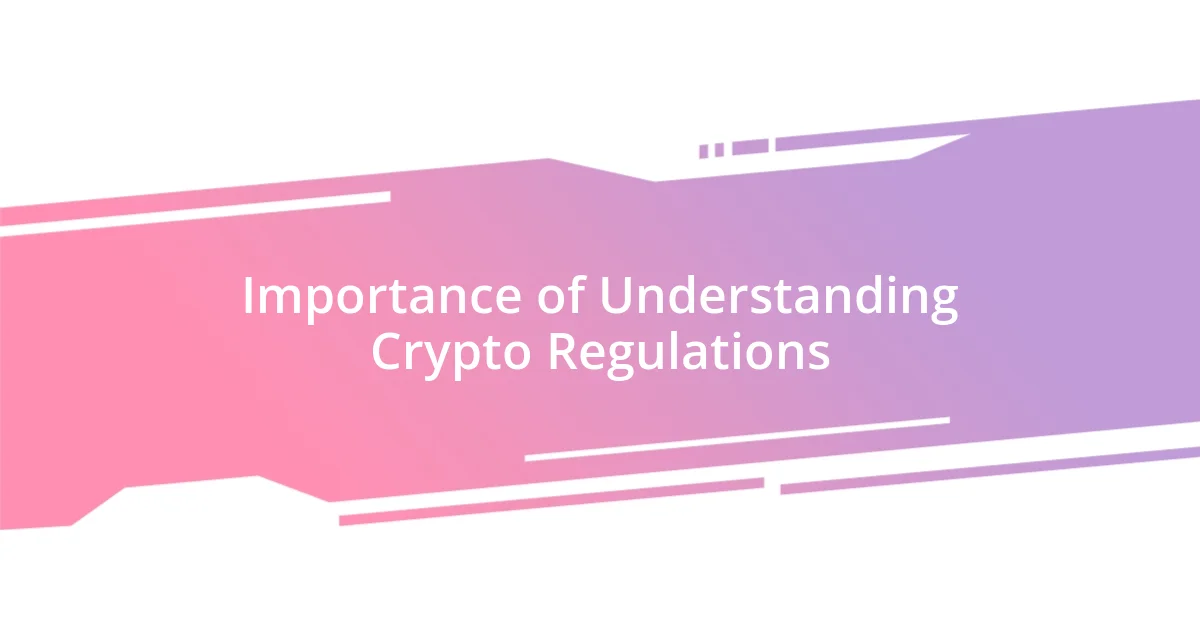
Importance of Understanding Crypto Regulations
Understanding the importance of crypto regulations cannot be overstated. When I first dabbled in cryptocurrency, I underestimated how essential it was to comply with local laws. One minor misunderstanding nearly cost me a significant investment, highlighting that regulations are designed to protect not just the financial system, but also the individuals participating in it.
Moreover, as I engaged more with the crypto community, I learned that being aware of these regulations fosters trust. Each time I shared tips with fellow enthusiasts, the conversation about compliance and legality became central. I found that a solid grasp of the rules helps to dispel fears and promotes a shared sense of security, making our transactions not just smoother but also more legitimate.
Finally, I’ve come to appreciate that a thorough understanding of crypto regulations can open doors to new opportunities. For instance, knowing the ins and outs of tax obligations can help prevent nasty surprises come filing season. It was enlightening to realize that being informed is not only about avoiding pitfalls but can also enhance my ability to engage confidently in crypto markets.
| Reason | Insight |
|---|---|
| Protection | Understanding regulations safeguards against financial losses. |
| Trust | Knowledge fosters trust within the crypto community. |
| Opportunities | Awareness can reveal beneficial opportunities in the crypto space. |
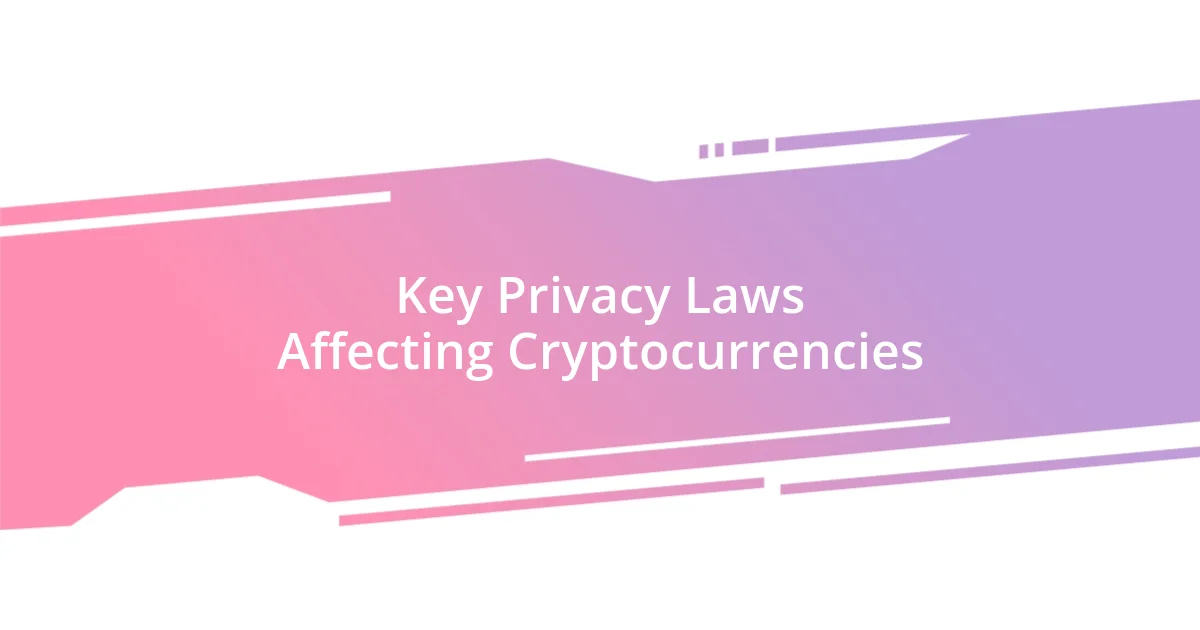
Key Privacy Laws Affecting Cryptocurrencies
Understanding the privacy laws impacting cryptocurrencies is essential for anyone diving into this digital landscape. In my experience, one of the most significant regulations is the General Data Protection Regulation (GDPR) in Europe. It emphasizes user consent and data protection, forcing cryptocurrency platforms to rethink how they handle personal information. I remember feeling a surge of confidence when I realized that these regulations aimed to protect users like me, ensuring that my data wouldn’t be mishandled.
Among other key laws affecting crypto privacy are the Bank Secrecy Act (BSA) and the Financial Action Task Force (FATF) guidelines. They aim to curb money laundering and financial crimes but also create challenges for users seeking anonymity. When I first learned about these requirements, I felt a pang of frustration; it seemed like my pursuit of privacy was at odds with compliance measures. Here’s a succinct overview:
- General Data Protection Regulation (GDPR): Protects user data, ensuring platforms handle personal information with care.
- Bank Secrecy Act (BSA): Enforces reporting requirements that may compromise user anonymity.
- Financial Action Task Force (FATF): Sets guidelines for anti-money laundering, impacting how exchanges verify user identities.
Navigating these laws isn’t just about following rules; it’s about understanding the balance between privacy and security, which can be a real emotional tug-of-war.
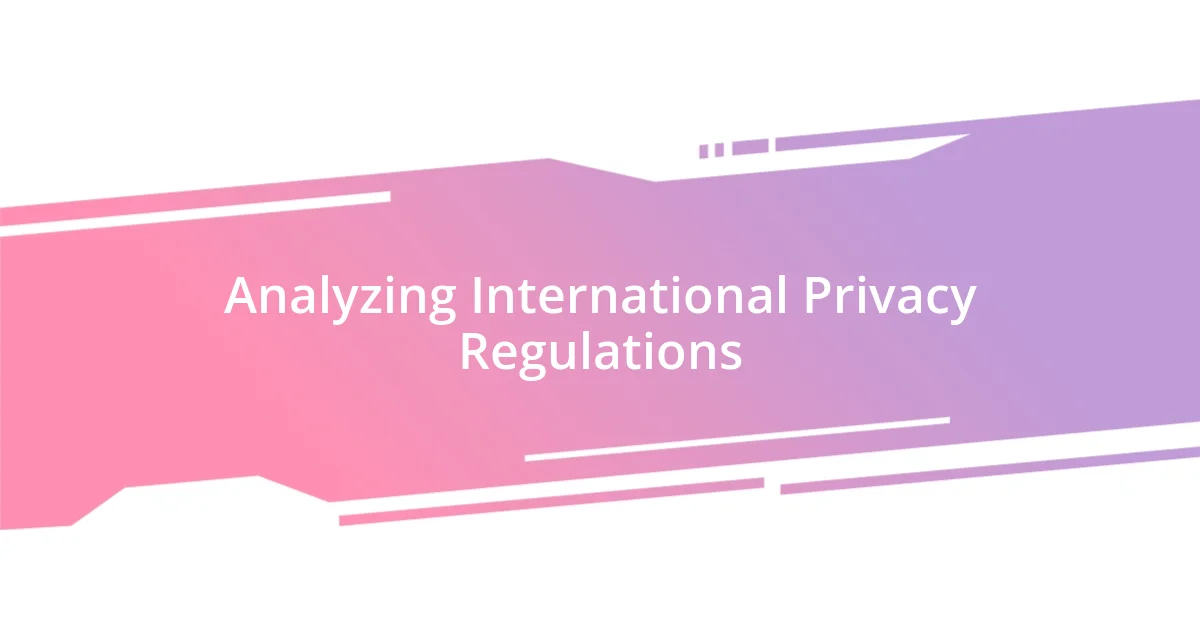
Analyzing International Privacy Regulations
When analyzing international privacy regulations, one cannot overlook the stark differences between regions. Take Europe’s GDPR, for instance, which stands firmly on the principles of user data protection. I remember reading about the hefty fines companies could face for failing to comply, and it made me wonder: how can we ensure our cryptocurrencies are handled with such care elsewhere?
In contrast, the U.S. follows a patchwork of laws that can be confusing. States like California have their own privacy acts, which often differ from federal regulations. I recall grappling with the idea that one state might allow more freedom for crypto exchanges while another imposes strict rules. How do I navigate those discrepancies when trading?
As I delved deeper, I discovered that each law carries its unique implications for privacy and security. The variance made me appreciate the need for comprehensive strategies tailored to different jurisdictions. I once had to adjust my tactics based on local regulations during a crypto transaction. It was a learning moment, underlining that awareness of these laws isn’t just beneficial—it’s essential for playing it safe in the crypto realm.
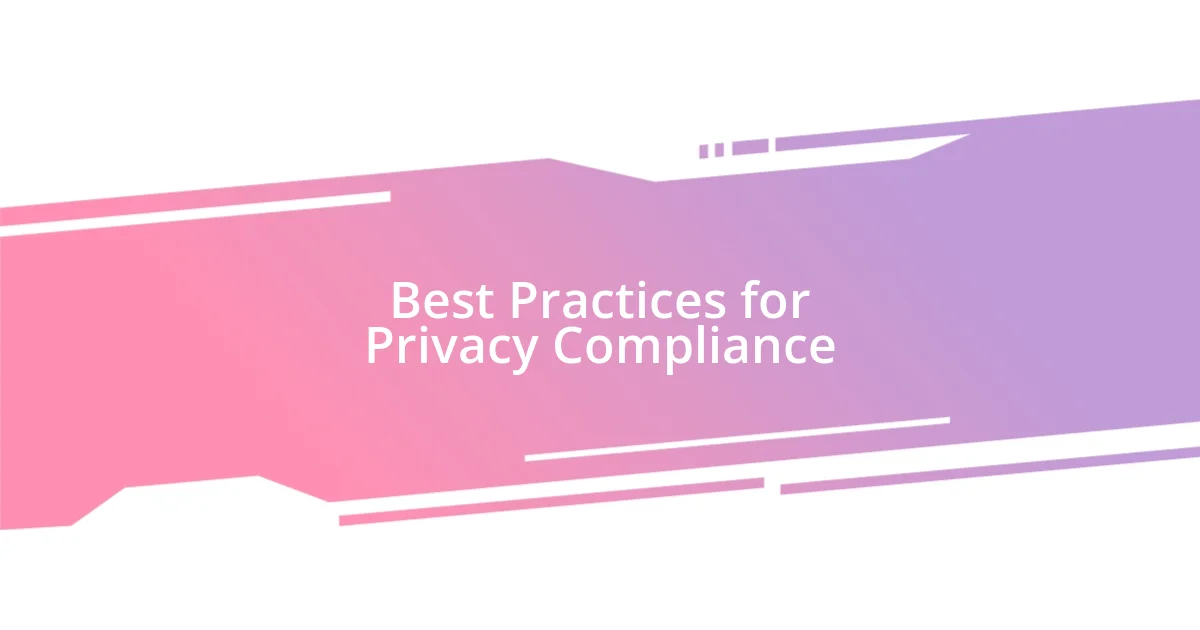
Best Practices for Privacy Compliance
Best Practices for Privacy Compliance
To ensure compliance with privacy laws in the cryptocurrency space, one of the best practices I’ve adopted is conducting regular audits of data handling processes. This helps spot potential vulnerabilities before they become issues. I remember the first time I jumped into an audit; it felt overwhelming, but it illuminated gaps I didn’t realize existed. Having a clear understanding of where user data resides and how it’s processed is crucial for compliance.
Another essential practice is obtaining explicit user consent for data collection and processing. I often think back to my initial experience with consent forms—they felt tedious but necessary. By being transparent with users about how their information is used, platforms not only comply with regulations like the GDPR but also build trust. Have you ever hesitated to provide your data? I know I have, and that hesitation often stems from a lack of clarity.
Finally, training employees on privacy regulations is vital. I once participated in a workshop that shed light on the importance of privacy from various angles. The more knowledgeable everyone is about the laws that govern our actions, the less likely we are to make unintentional mistakes that could lead to significant compliance failures. It made me realize that privacy isn’t just a legal issue; it’s a collective responsibility.
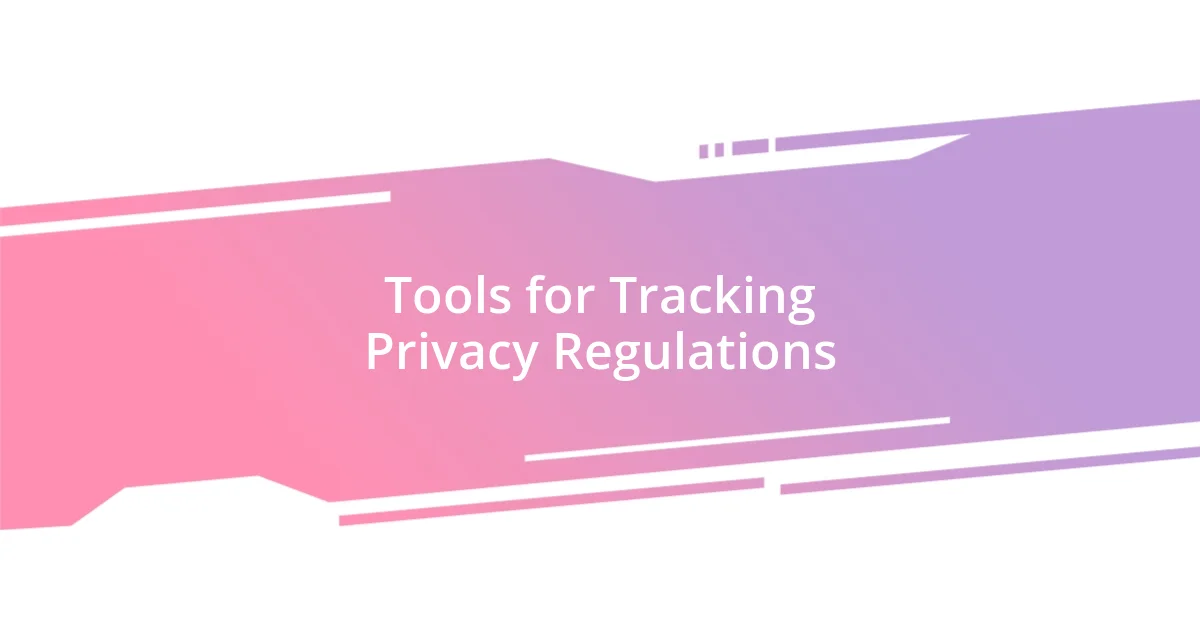
Tools for Tracking Privacy Regulations
One of the most effective tools I’ve come across for tracking privacy regulations is a centralized regulatory compliance platform. These platforms aggregate laws and updates from multiple jurisdictions, allowing me to stay informed without diving into each regulation separately. I remember the first time I relied on such a tool; it saved me hours of research and gave me a clearer picture of my responsibilities—what a relief it was!
Another useful approach involves subscribing to newsletters and legal blogs focused on privacy laws. Engaging with content from experts in the field not only keeps me updated but often presents interpretations that I hadn’t considered. I still recall reading a thought-provoking article that challenged my understanding of how regional laws could impact crypto transactions. It sparked a flurry of questions in my mind—how could I adjust my practices to remain compliant while still growing my investments?
Additionally, attending webinars or conferences dedicated to privacy issues has been invaluable. Networking with peers and experts allows me to exchange insights and best practices, often providing real-world applications of compliance strategies. I distinctly remember a panel discussion where a speaker shared their experience navigating a major regulatory shift. Their insights encouraged me to take a proactive approach—what if I could predict changes before they took effect? It’s fascinating how these tools and resources can shape our understanding and application of privacy regulations in the crypto landscape.












